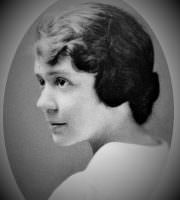About Hildegarde Flanner
Born into a progressive Indianapolis family, June Hildegarde Flanner (June 3, 1899 – May 27, 1987) was an American poet, essayist, playwright and conservationist. She enrolled at the University of California at Berkeley at the age of twenty, and her frst book of poems came out shortly thereafter. A student of the poet Witter Bynner, Flanner developed an abiding love of the natural world of California, undiminished even by the infamous Berkeley hills fire that destroyed her family home in 1923. She married the designer Frederick Monhof, whose engravings graced many of her books, and took up residence in Altadena, where she lived for thirty-six years.Flanner's poetry represented a response to the world around her. While in school at Berkeley, she wrote 'Young Girl' and received the Emily Chamberlain Cook Prize. The poem described the path of a woman who was trying to make sense of the world around her through her own and God's eyes. She wrote and described her and her family's experience in the great Berkeley fire of 1923 in 'Wildfire: Berkeley, 1923' and 'To My Books Who Perished by Fire'. Her Altadena garden was the source of works such as 'Pacific Winter', 'White Magnolia Blossom,' 'The Owl,' and 'The Snail'. Her poems 'Hawk Is a Woman', 'Flight', 'Never Ask Why', and 'Rattlesnake' represented an anticipated fear of the devastating power that humans exhibited in killing one another. These were published shortly before World War II.
Flanner's early poetry, which expressed a variety of female voices unusual at the time, displayed a passionate connection to the Southern California landscape and recorded her alarm as her pristine adopted region was transformed by urban development.
The publication of her chapbook If There is Time by New Directions in 1942 signaled her stature as a serious poet, but other interests and a gradually dwindling readership interrupted her career, and no major collection followed for almost forty years. Even after she and Monhof fled urbanization to renovate an old Napa estate in 1962, she despaired that [even the earth itself is altered... threatens to become a memory] (A Vanishing Land, 1980). In the last eight years of her life, her prose and poetry found new audiences through four books published by John Daniel.
Browse all poems and texts published on Hildegarde Flanner









